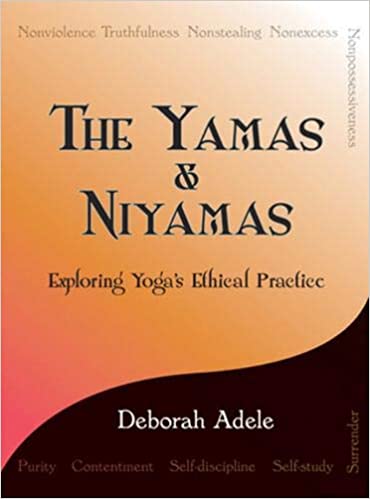
In a world crammed with needs and fixed competitors, the idea of Asteya, or non-stealing, emerges as a basic precept not solely in yoga but additionally in varied facets of life. This historic observe, rooted within the moral teachings of sage Patanjali, presents profound insights into private development, societal concord, and non secular growth.
Mahatma Gandhi’s quote resonates deeply with this precept: “The world has sufficient for everybody’s want, however not sufficient for everybody’s greed.”
This illustrates the concept that abundance exists, however greed and need can result in shortage. Asteya encourages us to acknowledge the sufficiency in our lives and promotes a mindset of generosity and gratitude..
What’s Asteya?
Within the collection of 5 Yamas (social ethics) defined by sage Patanjali in Yoga Sutras, Asteya is the third Yama which accurately means Non-stealing.
To grasp Asteya (non-stealing), one wants to appreciate the reality that their option to happiness doesn’t lie in snatching away the possessions of one other. Due to this fact, within the path of yoga (and likewise in each day life), asteya is restraining from taking what doesn’t belong to you, what isn’t wanted, and what’s greater than your share.
The phrase Asteya can have a number of different implications in addition to non-stealing, like, non-covetousness and generosity. On the coronary heart of this observe is to restrain from expressing possession of something that contributes to the well-being of different creations.
Nevertheless, the observe of Asteya expands past the bodily exercise of stealing. In line with the texts compiled by Patanjali, Asteya needs to be practiced in motion, phrases, and ideas.
- Asteya of Actions– Asteya of actions is essentially the most obvious type, the place bodily possession of one other particular person is unjustly taken away for private acquire.
- Asteya of Ideas – Stealing concepts or different mental property. It may possibly additionally check with abolishing ideas of greed and covetousness
- Asteya of Phrases – Deceptive or manipulative phrases that steal the correct or goodwill of others.
It is very important be aware that in yogic practices, Asteya is extra of an ethical code, than a authorized code. And this is smart since legal guidelines may be unjust and simply manipulated by the highly effective. Thus Asteya in yoga will not be associated to the observance of the state legislation, however an integral part in constructing private ethical character.
The Distinction between Want and Want
Within the observe of Asteya, it’s essential to know which of our actions or intents falls within the class of stealing and which not. There’s a refined line that separates the needs from the precise want and that’s the basis of Asteya’s observe.
Deborah Adele, an ERYT500, defined this in her guide “The Yamas & Niyamas: Exploring Yoga’s Moral Apply”:

“It’s usually onerous to know the place to attract the road in simply the place an excessive amount of lies. Yoga addresses this dilemma fantastically: Collect all of the sources you want to help your specific service on the earth. No extra; no much less. In different phrases, we’re requested to stroll a nice line between stealing from others and stealing from ourselves. If we take greater than we’d like, in any space of our lives, we’re stealing from others. If we deny ourselves the sources we have to attain our full potential, we’re stealing from ourselves.”
The Root Reason behind Asteya

Let’s ask ourselves, why do folks steal? On this world of abundance, why are folks compelled to commit one thing as degrading as stealing? It’s due to our insecurities, greed, jealousy, covetousness, worry, psychological exhaustion, and ego. Nevertheless, even these causes can’t be thought of the basis reason for Asteya.
The foundation reason for Asteya is an innate sense of missing, embedded deep throughout the soul. This sense of missing generates obsession over a need or need. And failing to amass the article of need naturally leads one to steal. Thus it’s broadly suggested for a person to observe self-contentment growing actions to realize Asteya.
Asteya in Faith
Asteya isn’t just a pillar idea in yoga however in religions like Hinduism, Jainism, and Buddhism as properly. In Jainism, Asteya is one in all 5 main vows, PanchMahavrata. Jain scriptures strictly instruct abstinence from stealing, because it causes himsa (violence).
In line with Jain’s philosophy, the possessions of males are thought of their exterior vitalities. And thus stealing the possessions damages the exterior vitality. This Philosophy is talked about by Jain trainer Acharya Amritchandra in Purusarthasiddhyupaya. It additional elaborates that theft will at all times result in ahimsa, and the underlying reason for theft is ardour.
In Hinduism, Asteya is talked about fairly extensively throughout totally different non secular literature. In line with Manusmriti, a revered non secular textual content on Dharmashastra, Dharma is five-fold, one in all which is Asteya, the opposite 4 being Ahimsa, Satya, Soucham, and Indiryanigraha.
Manusmriti states that the will to earn wealth via illegitimate means eats away at one’s soul, corrupting it from inside. Asteya can also be present in Manu’s Code, which he termed as Chourya-Bhava (to keep away from theft.) One other Sixth-century Hindu thinker, Prasastapada, centered on the inner utility of Asteya. His texts affiliate Asteya with the inner rejection of all feelings and ideas of unrighteousness.
Character growth with Asteya
Practising Asteya is an elaborate way of life course of which is sure to carry many persona adjustments. Asteya is not going to solely educate you abstinence from stealing however rework your worldview.
- You’ll turn into a beneficiant contributor to your society
- You’ll study to respect the dedication of time
- With internal pleasure, you can be free from the reaches of tension and stress
- You may be much less more likely to develop melancholy or different anxiousness problems
- Others will discover higher consolation in sharing their concepts and feelings with you.
- Your thoughts and physique might be in concord and peace
- You’ll sleep like a toddler
- You may be extra aware of your social and environmental surrounding
Philosophies to Develop Asteya

To observe Asteya there are specific philosophies that you want to incorporate into your way of life. A single tracked notion of materialistic thievery from a authorized perspective has little relevance to Asteya.
Asteya in its entirety encompasses an extensively broad view, which contains totally different ethical philosophies.
1. Time is valuable
Do you know you could possibly steal time? For instance, once you make an appointment and arrive late, you waste one other particular person’s time. The time that particular person would have in any other case utilized in doing one thing productive. So if you find yourself being late you might be stealing the utility of that individual time, from one other particular person’s life.
To resolve this difficulty and develop Asteya of time, you want to first notice that point is valuable. Generally we’re not deliberately late, however we simply lack time administration expertise. So in such instances develop time administration expertise. Make routines and observe via by setting cellular reminders.
2. It’s a world of Abundance
This philosophy is necessary in eliminating habits of hoarding. If you retailer greater than you want, somebody in some nook of the world is robbed of his/her fundamental wants. By hoarding, you don’t get to witness any quick repercussions, however relaxation assured it units a sequence of ripple results that hits somebody underprivileged.
Thus the idea of Asteya in yoga can also be about abstaining from hoarding. However why do folks hoard? The tendency to hoard generates from the worry of operating out of sources. Thus you have to reassure your self that we stay in a world of plentiful sources and there may be sufficient for everybody’s wants. There may be completely no purpose to panic and begin hoarding.
However this hoarding tendency has been cultured by mankind for thus lengthy, that panic hoarding has diluted itself and manifested integrally inside human nature. Sadly for many individuals hoarding has turn into a lifestyle. Such individuals are in important want of Asteya rehabilitation. Such folks want even stricter reassurances on the notion of abundance, and oblique penalties of greed. Bear in mind, the second you eat greater than you want you really steal one other particular person’s want.
3. A sustainable useful resource gathering
A philosophy that completes the thought of abundance is the thought of Sustainability. Our world has plentiful sources, however not limitless. When sufficient folks begin hoarding all around the globe, we find yourself stealing from our future generations. Mankind has already set on the trail of mindlessly depleting earth’s sources, but when we don’t put a examine on ourselves, our offsprings will merely starve to dying.
Yoga as a self-discipline is ever thoughtful in the direction of nature and different creations. Thus the Asteya yama of yoga can also be directed in the direction of advising us into clever and sustainable use of world sources.
4. Concepts are private
Folks’s concepts are their mental property, even those that aren’t protected by mental property rights. Asteya propagates that folks ought to develop an innate sense of valuing one other particular person’s concept, no matter his/her place. Stealing of concepts, even the trivial ones, is as grave as some other type of stealing.
5. Generosity eliminates Stealing
Generosity eliminates stealing like, mild eliminates darkness. Stealing and generosity are strikingly reverse to one another. Thus growing the behavior of giving, sharing and contributing, will robotically develop Asteya.
6. Asteya as a path to peace
Peace is a good motivator for Asteya. It’s believed that Stealing at all times stirs violence, the place violence agitates peace, each inner and exterior. Naturally, Asteya may be thought of as a path that results in peace. Asteya retains violence at bay and permits peace to settle. Inversely for somebody who strives for peace, there might be a pure inclination to abstain from stealing. Thus a peaceable psychological orientation can type the muse of Asteya.
7. Self-Contentment cures the basis trigger
Self-contentment might introduce you to true internal pleasure and absolve all sense of missing which is the basis reason for thievery. When there may be self-contentment, it’s usually thought of the preliminary requirement within the pursuit of Asteya. Self-contentment is achieved by appreciating what we now have ( which diverts our focus from what we don’t have.)
“Be content material with what you could have: rejoice in the best way issues are. If you notice there may be nothing missing, the entire world belongs to you.” – This quote by Lao Tzu might be one of the simplest ways to summarize the relation between Self-Contentment and Asteya.
Practising Asteya
The beforehand talked about philosophies will act like an mental warm-up to your Asteya practices. The understanding of the philosophies will additional develop inside you thru the practices. And with the correct appropriation of the practices and understanding of the philosophies, you’ll efficiently obtain the strategy of Asteya.
- Confide in your feelings and be uncovered to your insecurities.
- Preserve appointments and don’t be late
- Preserve work deadlines.
- Work together with nature.
- Purchase your necessities on a weekly foundation, reasonably than hoarding.
- Write down all of the constructive issues you could have in life. And each time a way of lack begins to creep in, look via the record and mirror on them.
- Meditate frequently with respiratory workout routines
- Apply Asana and mudra, particularly for calming your thoughts
- Make a behavior of sticking to the guarantees you make
- Develop readability of thought, and categorical your ideas clearly to keep away from confusion.
- Study to say no, particularly in conditions that may drive your arms into breaking a dedication.
- Study to be a greater listener.
- In a yoga class don’t intrude with one other’s routine or sequence. Keep on with your mat.
- Be true to your self in the course of the Asana observe. Don’t drive your postures for superficial causes.
Do not forget that on the finish of the day Asteya goes to be a aware observe. There aren’t any fascinating or informal practices that robotically lead as much as Asteya. The dedication practices of Asteya are difficult and demand robust will and dedication. Thus it’s advisable to observe the whole eight limb system of Patanjali, which might be holistic and efficient in growing Asteya.

